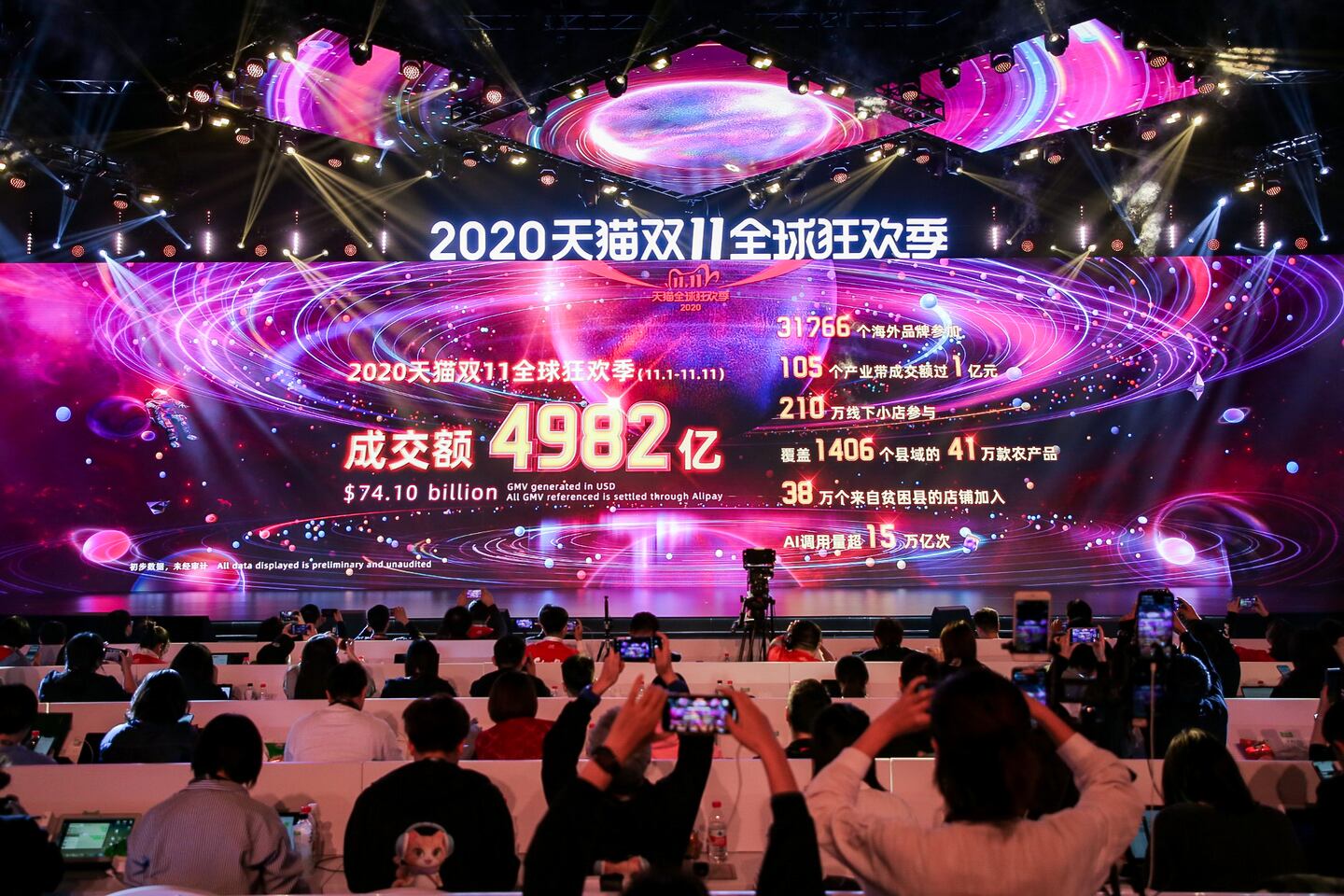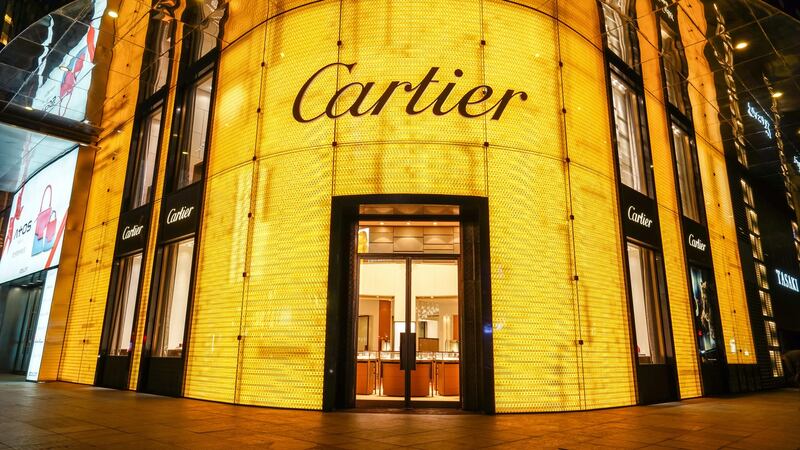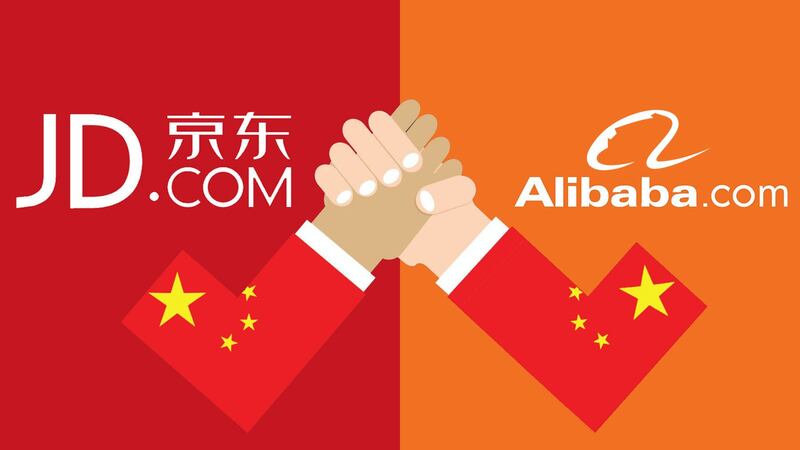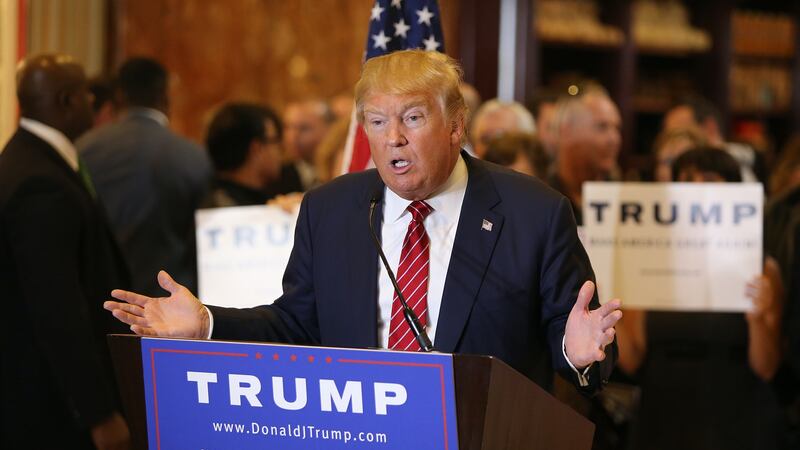
The Business of Fashion
Agenda-setting intelligence, analysis and advice for the global fashion community.

Agenda-setting intelligence, analysis and advice for the global fashion community.

Singles’ Day is always big. Huge numbers and flamboyant galas with big international stars like Katy Perry play out on big screens tallying up record-breaking sales in dizzying fashion.
This year was no exception, even as the shadow of a global pandemic casts a pall over much of the world. Combined, China’s top two e-commerce players raked in more than $116 billion in gross merchandise volume (GMV) over the Singles' Day sales periods. Alibaba said GMV on its platforms was up 26 percent over last year, reaching 498.2 billion yuan ($75 billion). JD.com also set a new sales record of 271.5 billion yuan ($41 billion) during the event, growing 33 percent compared to last year.
In China, which has seen consumption bounce back and even accelerate (especially online) since mid-year, the lead-up to Singles' Day, known as Double 11 in China, felt amplified to a particularly high pitch in 2020. There was a palpable feeling in the air that blowing off some steam by buying into the shopping frenzy was necessary in a year deprived of frivolity in many other respects.
A cursory glance at sales numbers for that initial sales period supports the hypothesis that an event on the scale of Double 11 is a boon for big brands.
ADVERTISEMENT
On Tmall, Nike’s turnover exceeded 100 million yuan ($14.9 million) one minute after the opening on November 1 and within 111 minutes 100 brands topped GMV of 100 million yuan ($15.1 million), including Adidas, Apple, L’Oréal and Estée Lauder.
While those with big budgets, big teams and big experiences can really throw their weight behind a Singles' Day effort, the dynamic creates even more noise for smaller, independent and direct-to-consumer brands to cut through in order to get noticed. But in spite of these obstacles, this year, more emerging brands seemed to break through the shopping festival than ever before.
According to data from Alibaba, 357 emerging brands (those with less than three years on Alibaba’s platforms) became top sellers in their respective subcategories over the festival period. Just one year ago, only 11 emerging brands managed the same feat. More than 1,800 emerging brands surpassed their GMV from Double 11 last year and, of these, 94 emerging brands enjoyed sales growth of over 1,000 percent.
If you are a fashion brand that is getting some heat, growing fast, interesting, a bit sexy, you will get tonnes of support from these platforms.
High-end sneaker brand Golden Goose was among the international brands participating in Double 11 for the first time. According to Asia-Pacific Chief Executive Mauro Maggioni, the brand beat their sales target by 40 percent and 60 percent of sales went to first-time customers.
Abby’s Choice, a subsidiary of C-Beauty superstar Perfect Diary, launched its flagship store on Tmall in February this year and was also participating in Double 11 for the first time. On the first day of the sales period, its sales turnover exceeded 20 million yuan ($3 million).
How did brands like these manage to leverage an event that has been traditionally biased in favour of bigger brands with far deeper pockets?
Cool Factor Beats Size Hands Down
Small and independent players new to the Singles' Day arena were given a leg-up this year on Alibaba’s platforms with a specific showcase for new products and brands. Alibaba also hosted a virtual conference on November 11 for new brands, including speakers such as Joe Tsai, executive vice chairman of Alibaba, as well as brands talking about what they had learned from their first Double 11 experience.
ADVERTISEMENT
The message from the platforms, especially in a post-Covid age when new brands are flooding into China in unprecedented numbers to tap into its increasingly important consumer market, seems clear: You are welcome.
“I can tell you very, very, very clearly and with a lot of confidence: Alibaba loves hot brands. They love new, hot movement. They are not [actually] about scale or size; they are about growth. I think people fail to realise that,” explained Josh Gardner, CEO of Kung Fu Data, an e-commerce partner operating a portfolio of flagship stores on Tmall and JD.com — largely for independent international brands with an average annual GMV of 10 to 30 million yuan ($1.5 to $4.5 million).
“I just signed an affordable luxury fashion label that is extremely hot with daigou (grey market) sellers and Tmall are aggressively approaching us, jumping all over us to get the store up and going, to do Double 11. If you are in that range, if you are a fashion brand that is getting some heat, growing fast, interesting, a bit sexy, you will get tonnes of support from these platforms,” he added.
Sustainable shoe and apparel brand Allbirds had exactly this experience when they launched their China operation in 2019, which included not only physical store openings, but an e-commerce partnership with Tmall.
In its first Double 11 event in 2019, the brand was highlighted by Alibaba on its marketing website, Alizila, as one of the brand success stories of that festival period. This year the brand tripled its sales for the festival period and is on track to double China e-commerce sales for the year, compared with 2019.
“The value that Tmall is inherently looking for is unique propositions with interesting stories and great products that get their consumer base excited. That really has to be a focus for all operators if you want to be in it for the long term,” said Allbirds Senior Vice President of Commercial Sandeep Verma.
The value that Tmall is inherently looking for is unique propositions with interesting stories and great products that get their consumer base excited.
Livestreaming is one major way brands have been directing traffic to their stores on major platforms and, during its Double 11 campaign, Golden Goose capitalised on a five-minute slot with livestreaming superhost Li Jiaqi, to do exactly that.
“We had a huge spike [of] millions of people entering our flagship store when we did the livestream… and were able to do a sizeable amount of conversions,” Maggioni said.
ADVERTISEMENT
Growth has always been the goal for Chinese e-commerce platforms, but with a user base of more than 750 million people, it’s harder and harder to achieve for a behemoth the size of Alibaba. New brands, which equal new traffic, have become the most prized commodity in China’s e-commerce space.
Next Year’s Singles' Day Planning Starts Now
As much as brands may like to take a day or two to celebrate their Double 11 sales success, there is actually no better time to start preparing for Singles' Day 2021 than November 12, 2020.
One reason some smaller brands fail to capitalise on Double 11 is insufficient preparation because there is a widespread lack of understanding about the timeline of Double 11.
This year, extra days were added to the official sales period on Alibaba’s platforms, with an initial three-day sale on November 1 to 3 preceding a second sale on November 11 (the intense technical and logistics pressure of processing so many orders within a 24-hour period had become untenable, necessitating this change).
As sales periods are pushed earlier, the pre-sales ramp-up is also earlier. Participating brands are finalised in September, and participating products need to be in stock by early October. Double 11 is essentially a two-month event that requires many more months of planning for brands of any size.
For smaller brands, without huge teams to support a major Double 11 effort, an all-hands effort across teams and skillsets may be required. Allbirds, which has a team of 50 people in China, trained all its staff in advance to handle customer service through Tmall, so they could handle the massive influx of enquiries over the festival period.
This is vital because Double 11 conversions increase dramatically if stores have the ability to keep on top of customer service. Gardner estimates his customer service team sees conversions of 80 to 90 percent when they interact with a customer this time of year, compared to a normal rate of 30 to 40 percent throughout the rest of the year.
To Discount or Not to Discount
Requirements from platforms for participating brands change from year to year. According to brands and operators canvassed by BoF, some years a platform like Tmall might demand brands include a certain number of discounted products, at a certain level of discount (such as a 50 percent minimum discount on sale items). Other years they don’t.
The discounting aspect of Double 11 has long bothered fashion brands, especially luxury brands, as well as smaller players new to China market without the margins or scale to get away with widespread discounting and afraid of diluting their brand.
Increasingly, the desire of platforms to attract luxury fashion and beauty brands seems to be opening the door to exploring avenues other than discounting for Double 11, such as exclusive products.
Allbirds, for example, has relied on exclusive products, combined with gifts with purchase, in order to avoid discounting, even over the festival period. According to Verma, what consumers are looking for on Double 11 is value, which is not necessarily the same thing as a cheaper price point.
“[For us] it’s [about] exclusive products… plus a story that we think is quite inspirational and a way of packaging all that in a way that consumers believe is something special,” he said.
Golden Goose also joined the “no discount” brigade this year: Maggioni described it as his mantra leading up to Double 11. Though he said there was some pushback from Tmall initially when he declined to offer discounts, eventually they were “okay with us not doing discount because from the very beginning we made it a condition of being in Tmall,” Maggioni added.
Gardner believes brands often have the wrong attitude when it comes to discounting on Double 11. “I think brands are really arrogant, to be honest,” he said. “The assumption that the whole event is a discount that’s going to damage your brand is false. Actually, it’s the opposite,” he said.
It is true that driving sales on Double 11 has positive knock-on effects for brands that last long beyond the actual festival period. More sales can mean an elevated store and product ranking, which means platform algorithms are more likely to promote and recommend your brand’s products in the future.
As the example of Allbirds shows, either the discounting or non-discounting avenue can work for brands because, the fact of the matter is, on Double 11, hundreds of millions of people flood these platforms with the intention to buy.
They might put their most desired products in their cart in the weeks and months ahead of November and wait to see if they are discounted, but on the day, when they open up their Tmall or JD.com app to find no discount has been applied, they often buy them anyway.
时尚与美容
FASHION & BEAUTY

China Overtakes US to be Richemont’s Biggest Market
The luxury conglomerate last week revealed its sales were down 2 percent globally in constant currency in the third quarter of 2020, after a 47 percent decline in the second. The recovery was driven by China, which has overtaken the US as Richemont’s biggest market after sales shot up 78 percent in the first six months of the year. Richemont said its new deal with Alibaba and Farfetch, which will see the luxury conglomerate and Chinese e-commerce titan invest $1.1 billion — $550 million each — in the online luxury fashion retailer and its new Chinese marketplace, would further drive its business in China. “A strong presence in China and an acceleration in digital initiatives have partially mitigated the consequences of temporary store closures and a halt in tourism worldwide,” Richemont Chairman Johann Rupert said in a statement. (Reuters)
Lagerfeld and Gaultier Sign Eyebrow-Raising Collaborations
After partnering with KFC to celebrate the 80th anniversary of its original fried chicken recipe, Karl Lagerfeld scored another surprising China collaboration with the country’s best-known beer brand, Tsingtao. The black-and-white “night owl” Muse collection included limited-edition bottles featuring cartoon images of Lagerfeld and his cat Choupette, beer cooler bags, and dishes. Meanwhile, French designer Jean Paul Gaultier has renewed a partnership with Chinese down jacket brand Bosideng for a second year. This is less of a surprising move and is likely to boost Bosideng’s fashion credentials and its efforts to become a global name, despite previous setbacks. (Content Commerce Insider)
科技与创新
TECH & INNOVATION

Will China’s New Anti-Trust Guidelines Rein in Tech Giants?
Monopolistic practices by internet platforms, such as demanding vendors to transact only on one platform exclusively or providing differentiated prices to customers based on their shopping history and profiles, could potentially be outlawed, according to the guideline released by the State Administration for Market Regulation on Tuesday. This is the first time the market regulator has attempted to legally define what constitutes anti-competition practices among internet companies. An overhaul to the Anti-Monopoly Law in January went only as far as tweaking the language to encompass internet firms. It will seek public opinion on the draft until the end of November. (South China Morning Post)
Kuaishou Files for Hong Kong IPO
Chinese video-sharing app Kuaishou has filed a prospectus to the Hong Kong stock exchange, paving the way for a listing in the city. The Beijing-based platform, backed by Chinese internet giant Tencent, is the second most popular short-video app in the country, trailing Bytedance’s Douyin, the domestic version of TikTok. The prospectus included the first disclosure of Kuaishou’s key financial details, including revenue for the first six months which grew by nearly 48.3 percent year-on-year to 25.3 billion yuan ($3.8 billion), according to the filing, in spite of this, the company booked an adjusted net loss of 6.3 billion yuan ($952 million) in the first half of the year. Kuaishou products, including its short video apps and mini programs running on Tencent’s WeChat, amassed a total of 302 million daily active users as of June 30 with users spending over 85 minutes on average on its platforms, according to the prospectus. (Technode)
消费与零售
CONSUMER & RETAIL

Luxury Brands Compete for Chinese Airport Store Space
Luxury brands, including Louis Vuitton, Gucci, Armani and Salvatore Ferragamo are all doubling down on duty-paid airport stores in China. Following their opening at Beijing’s new Daxing airport, Louis Vuitton is getting set to open a new store in Terminal 2 of Shanghai’s Hongqiao airport. Last month Shenzhen Airport cooperated with global real estate service provider Savills to attract investment from more than 100 commercial outlets, including brands such as Armani, Salvatore Ferragamo, Gucci and Dior Beauty, which will join existing stores from Cartier and Burberry in the airport. These brands are rushing to claim airport real estate in order to put themselves in the path of the millions of Chinese consumers who are traveling domestically as international travel remains complex and largely unappealing due to the pandemic. According to data released by the Ministry of Culture and Tourism, last month’s national Golden Week holiday saw 13.26 million Chinese passengers fly domestically, representing a return of 91 percent of travellers compared with the same period last year. (Ladymax)
China’s Spending Power Boosts International Brands at CIIE
In recent years, as the central government has worked to push China’s domestic consumption as the main driver of its economic growth, the China International Import Expo (CIIE) has been seen as a key forum for international brands China would like to see importing more high-quality goods to its growing middle class. If feedback from attendees at the most recent edition of CIIE, which ran from November 6 to 11 in Shanghai, is any indication, there is no sign of China’s consumption slowing. The import of consumer goods from abroad, especially high-end goods and cosmetics, has risen as much as 20 percent since April. “Sales of luxury goods in China are booming this year,” said Charles Kao, president of South Korean beauty firm Amorepacific Group’s China division. The pandemic may have limited their outbound travel, but has not affected their spending power much, he added. The Seoul-based firm’s online sales in China grew 80 percent in the third quarter. (Yicai Global)
政治、经济、社会
POLITICS, ECONOMY, SOCIETY

Chinese Officials Offer Little Reaction, But Netizens Revel in Trump Loss
Chinese President Xi Jinping was notably among world leaders who did not call to congratulate Joe Biden on his election win, but news of Trump’s loss spread quickly on Sina Weibo, drawing millions of mentions in the wake of his defeat. “You’re fired,” wrote one Chinese netizen in response to the news. Others continued to mock Trump, re-posting embarrassing videos and photos of the 45th president. Biden’s name shot to the top of trending charts and forums on the state-censored microblogging site, with millions of Weibo users weighing in about their hopes of a broader mood change after the Trump administration’s costly, drawn-out trade wars with Beijing that stoked tensions between the two world powers. (Vice)
China Launches Experimental 6G Satellite
China has leap-frogged the world in satellite communication. Not only did China send 13 more satellites into orbit earlier this week, it also successfully completed a world’s first, sending up a sixth-generation communications test satellite. The 6G satellite was jointly developed by Chengdu Guoxing Aerospace Technology, UESTC, and Beijing MinoSpace Technology and will be used to verify the performance of 6G technology (which is expected to be over 100 times faster than 5G technology) in space as the 6G frequency band will expand from the 5G millimetre wave frequency to the terahertz frequency, Chinese media reported. The satellite is the first technical test of terahertz communication’s application in space, said Chinese Academy of Engineering’s Xu Yangsheng. (Asia Times)
China Decoded wants to hear from you. Send tips, suggestions, complaints and compliments to our Shanghai-based Asia Correspondent casey.hall@businessoffashion.com.
With consumers tightening their belts in China, the battle between global fast fashion brands and local high street giants has intensified.
Investors are bracing for a steep slowdown in luxury sales when luxury companies report their first quarter results, reflecting lacklustre Chinese demand.
The French beauty giant’s two latest deals are part of a wider M&A push by global players to capture a larger slice of the China market, targeting buzzy high-end brands that offer products with distinctive Chinese elements.
Post-Covid spend by US tourists in Europe has surged past 2019 levels. Chinese travellers, by contrast, have largely favoured domestic and regional destinations like Hong Kong, Singapore and Japan.